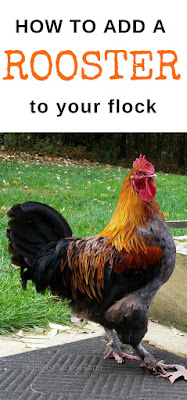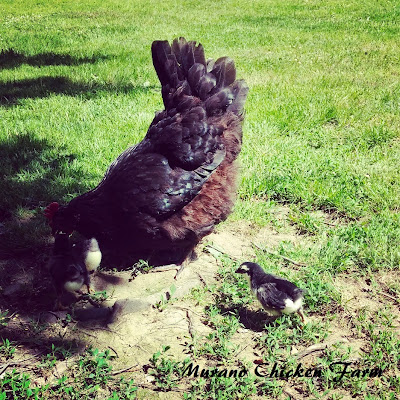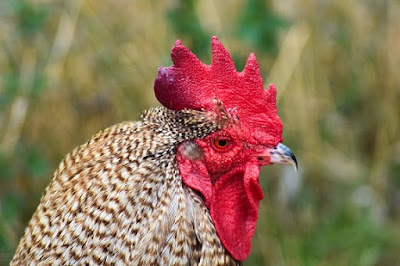Often the decision to add a rooster is made after the flock of hens has been established. One reason you may decide to add a rooster to an established flock of hens, is to protect the hens. A rooster will alert the hens of any danger approaching, giving them a chance to hide. A rooster will often confront a predator to protect his flock of hens, thus sacrificing himself for them.
Also, by adding a rooster to the flock, the hens eggs will then be fertilized. You'll need fertilized eggs if you want to hatch chicks.
If you decide to add a rooster into an already established flock, things can get a little tricky. The head hen doesn't always adapt well to the sudden drop in her ranking. Some hens don't appreciate a rooster trying to ahem...'romance' them. It can just generally upset the pecking order.
To avoid upsetting the hens too much, a gradual introduction is the best approach. Allowing them to acclimate to each other slowly can reduce squabbles and make the whole process go more smoothly. I choose one of these two methods each time that I want to introduce a new rooster to my flock.
How to add a Rooster to the flock
The easiest way to add a rooster to your flock is to get a male chick and let one of your hens raise it. The hen will protect it from the rest of the flock as it grows, and she will help it to integrate so you don't have to go through the introduction process.
You could go about this a few different ways. Either give your hen some fertile eggs to hatch, buy straight run chicks, or buy a cockerel chick if you choose a breed that can be sexed at hatch.
I prefer to use this method when adding a rooster to my flock.
When hatching eggs or buying straight run chicks, you'll probably have more than one cockerel in the bunch. I'm sure you've noticed that chickens have unique personalities and roosters are no different.
Raising a few roosters from chicks gives you an opportunity to observe their personality and choose the best rooster for your flock.
Raising him from a chick also gives you the chance to correct his behavior as he's growing up if you see him getting too aggressive towards people. Raising a friendly rooster isn't difficult, it just takes a little extra time on your part.
The second way is to add an adult rooster to the flock. You may choose this method if you're looking for particular traits in a rooster when breeding chickens. Certain traits aren't fully developed until the chicken is full grown so if you're looking for something specific, a fully developed rooster may be your best option.
It's more difficult to add an adult rooster to an established flock since they already have their pecking order established, and the head hen might not appreciate losing her 'boss role'. It can be done though and is very similar to adding a hen to the flock.
Obviously the first thing you'll want to do is quarantine the new rooster for a minimum of 2 weeks. He needs to be away from the flock where they do not have any contact with each other to insure that any disease or bugs he may have been exposed to previously can be handled before he meets your flock.
This can be lonely for a flock animal like a chicken, so make sure to give him extra attention. Put him in a spot that you can easily stop by to spend time with him many times throughout the day. This will also help you to gauge his personality before introducing him to the flock.
Here's an excellent article on what to look for when examining and observing a chicken in quarantine.
After his quarantine time is up, move him into the flock but in a separate cage the same as if you were adding a new hen to your flock. Only allow him out with the hens when you can supervise them.
When you first allow the rooster out with the flock it usually goes 1 of 3 ways.
1) Everything is fine and they all get along. (Hope for this one)
2) The hens pick on the rooster. Even though he's probably bigger than them, the original flock may still try to chase off the rooster. Since they outnumber him, they'll probably pick on him quite a bit before they settle down and get used to him. Be prepared to step in and separate him again if things get out of hand.
3) The rooster kinda goes a little crazy. With sudden access to an entire flock of hens, he might start acting like he's in overdrive and trying to mate with every hen that he can catch. This behavior will calm down in a short while, but in the meantime you'll want to keep him in his separate cage when you can't supervise.
Since you don't know what to expect when introducing a rooster to the hens, always make sure you can supervise their interactions the first few times!
Sudden access to his new flock can cause him to show aggression to you which you absolutely do not want! He may see you as a threat to him, or simply want to impress the ladies by defeating you as his opponent.
Either way, you'll want to continue to spend time with him (even if he has to be in his seperation cage) so he gets used to you and stops seeing you as a threat.
When adding a rooster to your flock, there's always a chance that he just won't be a good fit. If you try for a few months and he just can't get along with the flock, you may have to rehome him.
You can check with the flock owner from where he came from, to see if they would like to have him back....that's usually a long shot though! Many chicken keepers won't accept a rooster back because of flock biosecurity.
There are other options that I discuss in Rehoming a Roo: How and Why that will walk you through your next steps.
Hopefully though, the rooster will integrate perfectly into your flock and your girls will have a new protector and friend, and now you get to hatch chicks anytime you want!
~L
Want information on raising chickens, guineas and other poultry sent right to your email weekly? Click right here to join my list and get new posts sent directly to you the day they're published ... plus, you'll also get the free download '25 Ways to save money raising chickens'.




No comments:
Post a Comment